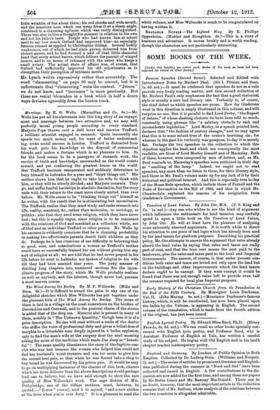Marriage. By H. G. Wells. (Macmillan and Co. 6s.)—Mr. Wells
has put all his cleverness into this long story of an engage- ment and marriage between two attractive and, we may add, perfectly moral young people according to every standard. Marjorie Pope throws over a dull lover and marries Trafford, a brilliant scientist engaged in research. Quite innocently she spends too much money and, for want of better understand- ing, seeks social success in London. Trafford is distracted from his work, puts his knowledge at the disposal of commercial friends, and makes a fortune which is no pleasure to him. So far the book seems to be a panegyric of research work, the service of truth and knowledge, unrewarded as the world counts reward, and yet conferring the greatest boons on the world. But Trafford becomes exasperated and suddenly determines to bury himself in Labrador for a year and "think things out." His mother shows him that he ought to take his wife to think with him, or they will be utterly divided ; and Marjorie consents. They go, and suffer fearful hardships in absolute desolation, but the story ends with their return to the coast more closely united than ever before. Mr. Wells seems to be "thinking things out" himself as he writes, with the result that he is stimulating but inconclusive. The Traffords realize that they must study and make research into life, reality, mankind, &c., rather than molecules, or sociology, or politics : also that they need some religion, which they have never had ; but this is equally vague, since religion is to be concerned with the relations of God and mankind as a collective whole, not of God and an individual Trafford or other person. Mr. Wells by his excuses is evidently conscious that he is straining probability in making two affectionate parents desert their children as they do. Perhaps he is less conscious of our difficulty in believing that so good, wise, and conscientious a woman as Trafford's mother could have so successfully trained her son without giving him any sort of religion at all: we are told that he had never prayed in his life before he went to Labrador nor spoken of religion to his wife till they had been married nine years. The jerky manner of dividing long chapters into numbered sections fits the incon- clusive progress of the story, which Mr. Wells probably realizes as well as anybody, and the interest, though never lost, pursues a most uneven course.










































 Previous page
Previous page